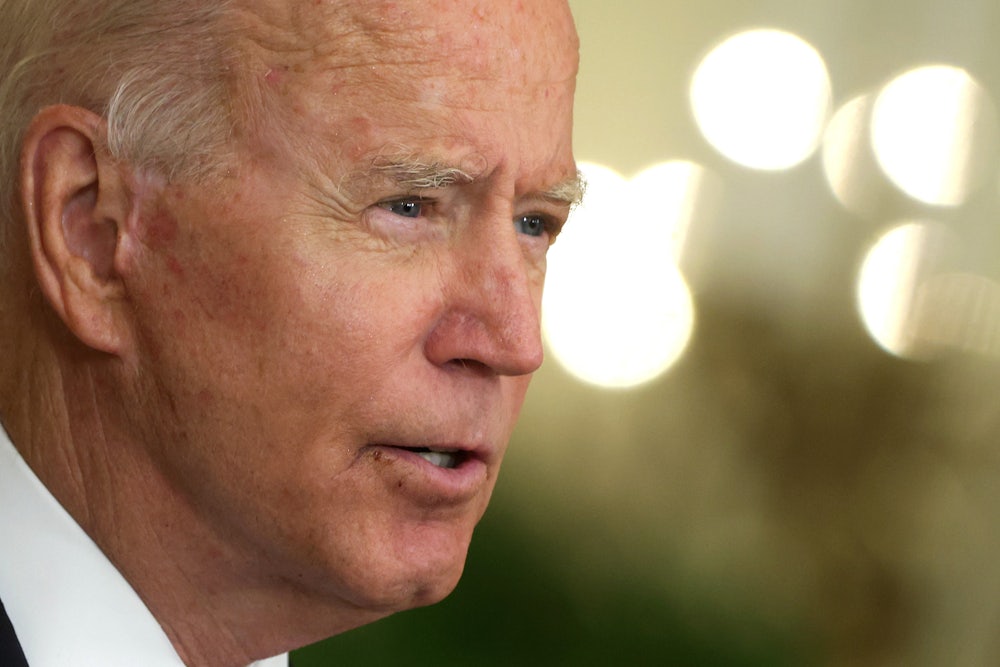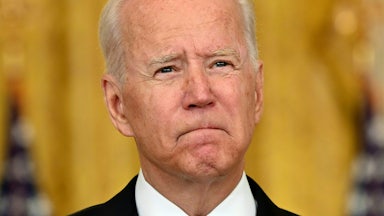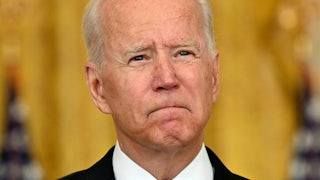As the Village and the far right continue to heap their scorn on Joe Biden for the way pulling out of Afghanistan has unleashed chaos in Kabul, threatening the lives of the Afghans who stood against the Taliban during the United States’ 20-year occupation, I still say the decision to get out of this unwinnable war took guts. Three previous presidents let the Afghanistan situation drag on while surely knowing that it was a disaster. Biden had the courage to do what none of his predecessors were willing to.
Additionally, this “we could have maintained a small force indefinitely” scolding is just wrong. We, under Donald Trump, signed a peace deal with the Taliban, telling them we’d leave by this May. We already delayed it. If we’d said we were delaying a second time, and indefinitely at that, Taliban fighters would likely have started targeting Americans again.
But none of this means that Biden is getting everything right, not by a long shot. He needs now to do two things on which the future of his presidency may rest: First, make sure all the Americans and as many American-allied Afghans as possible can get out safely; and second, and maybe more important from a public-consumption point of view, drop the tough-guy act.
It was somewhat reassuring to see Biden, in his Monday speech, say the words “the buck stops with me.” At least after four years of a president who blamed the deep state and fake news and the generals and his own staff, we have a president willing to take responsibility. But he has simultaneously, and since, dodged that same responsibility.
George Stephanopoulos asked Biden on Wednesday, “When you look at what’s happened over the last week, was it a failure of intelligence, planning, execution, or judgment?” That’s a straightforward question that the American people are surely wondering, and it deserved a more straightforward answer than the one Biden delivered: “Look, it was a simple choice, George. When you had the government of Afghanistan, the leader of that government, get in a plane and taking off and going to another country; when you saw the significant collapse of the Afghan troops we had trained, up to 300,000 of them, just leaving their equipment and taking off—that was, you know, I’m not, that’s what happened. That’s simply what happened.”
While that may have been “what happened,” it isn’t an answer to Stephanopoulos’s question. And trust me, we’re going to get an answer to that question someday soon. Some of the best reporters in America are boring in right now, trying to find out whether the real breakdown here happened at the Pentagon, the State Department, the National Security Agency, the Central Intelligence Agency, or the West Wing. If the answer turns out to be the West Wing, in whole or in part, that’s on Biden.
He ought to switch rhetorical gears and start owning up to the errors that were made. There may be good cause to fault the Afghan government and army, but Biden needs to leave that aside and acknowledge more error than he has. Yes, his political foes on the right will weaponize any such admission, but regular Americans make mistakes, too; they will understand. Additionally, Biden might consider showing a little more compassion here. Stephanopoulos asked him what he first thought when he saw those images of desperate people clinging to the landing gear of taxiing military planes. “What I thought was, we have to gain control of this,” Biden said. “We have to move this more quickly. We have to move in a way in which we can take control of that airport. And we did.”
Um ... how about something like: “Well, George, my first thought was of sympathy for those poor people. Many of those people risked their lives for us. We’re the United States of America, and we’ll keep our word to them.”
Stephanopoulos did ask Biden later in the interview specifically about our Afghan allies, and Biden did say, “As many as we can get out, we should.” But he never spoke with any compassion about them. As The New Republic’s Grace Segers observed, empathy is a “facet of the president’s political persona” that’s been “largely absent in his response to the plight of the Afghan people.”
The bigger issue here is this. In the spring of 2020, two things happened almost simultaneously: The Covid-19 virus hit, and it became obvious that Joe Biden was going to be the Democratic nominee. Instantly, he changed.
The Joe Biden the public had known for decades could be ... let’s say, erratic in terms of how he connected to people emotionally. Any time he had reason to reflect on his personal tragedies, he could be sympathetic and zoomed into the zeitgeist. But at other times, he could be less than appealing. He sometimes wielded his committee chair gavel in a haughty way. He never got far in his prior presidential runs. Recall that virtually no one wanted him to run in 2016, when he was coming directly off eight years as vice president. There were a lot of complicated reasons for that, but the bottom line is that if he’d occupied a more certain place in the collective Democratic heart, a groundswell of some kind would have ensued. None did.
Since March 2020, he’s barely missed a note. He’s been as tonally close to perfect, in a consistent way over a long period of time, as I’ve ever seen a politician be. The way he’s talked about the pandemic, the need to vax up, the economy, his domestic agenda, the needs of the working and middle classes—it’s all been spot on. He rose to the historical moment. It’s given him quite a lot of moral authority with the two-thirds of the country that isn’t off in Big Lie Land.
This week, for the first time in 17 months, we’ve seen a bit of the old, less attractive Biden, who is a little short and defensive, and not as empathetic. I guess he may think he’s channeling Harry Truman, but he really just needs to channel his better self.
Of course, we need to do what we need to do on the ground—get Americans and our Afghan allies to safety. If that doesn’t happen, the wheels could come off pretty fast. A return to basic competence after four years of Trumpian misrule has been a Biden administration selling point.
There’s still time to salvage the situation and clean up this unholy mess. But Biden’s personal credibility rests on the two pillars of his honesty and his decency. He’s in trouble if he loses one or both of those.








